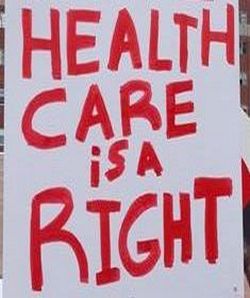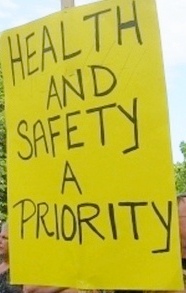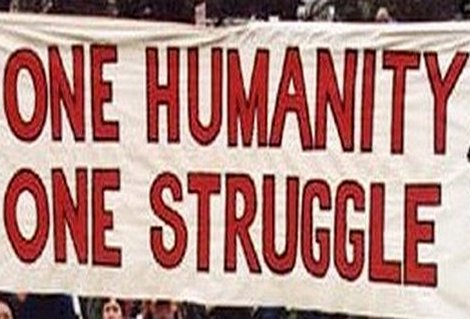|
April 14, 2020
How the Right to Health Care Poses
Itself During the Pandemic
  
Temporary Closure of Olymel's Agri-Food Yamachiche Plant in Quebec
• Workers Must Have the Final Say in Decisions That Affect Their
Health
- Normand Chouinard
What Healthcare Professionals Have to Say
• Nurses Working Both Sides of the Border Speak for
Themselves
- Enver Villamizar
• Nova Scotia Health Care Workers Demand Assurances on Safety Equipment
• BC Health Care Workers Demand Broader Support
#EdforMed
• Education Workers Support Health Care Workers
Temporary Closure of Olymel's Agri-Food Yamachiche Plant in Quebec
- Normand Chouinard -
 The danger that the COVID-19 outbreak could spread to large industrial
production centres considered essential has already become a reality
for several agri-food plants. This is the case at Olymel's Quebec
plants in Yamachiche; Saint-Esprit; F. Ménard in Ange Gardien,
which specializes in large-scale pork slaughter; Exceldor in
Saint-Bruno, which specializes in the further processing of poultry
products; and Viande du Breton in Rivière-du-Loup, a pork
slaughterhouse, to name but a few. In the case of the Yamachiche plant,
where close to 1,000 people work, it is reported that more than 100
people tested positive for COVID-19 in just a few days. The company's
senior
management was forced to cease operations as soon as the outbreak began
at the plant, four days after the first employee tested positive on
March 25. The company spokesperson maintains that all public health
recommendations regarding safety procedures on the plant's production
lines were followed to the letter. Olymel also defends itself by
claiming that its employees may have contracted the virus outside the
plant. The plant is expected to gradually resume operations on April
14, under public health supervision, after completing a 15-day
quarantine.
The danger that the COVID-19 outbreak could spread to large industrial
production centres considered essential has already become a reality
for several agri-food plants. This is the case at Olymel's Quebec
plants in Yamachiche; Saint-Esprit; F. Ménard in Ange Gardien,
which specializes in large-scale pork slaughter; Exceldor in
Saint-Bruno, which specializes in the further processing of poultry
products; and Viande du Breton in Rivière-du-Loup, a pork
slaughterhouse, to name but a few. In the case of the Yamachiche plant,
where close to 1,000 people work, it is reported that more than 100
people tested positive for COVID-19 in just a few days. The company's
senior
management was forced to cease operations as soon as the outbreak began
at the plant, four days after the first employee tested positive on
March 25. The company spokesperson maintains that all public health
recommendations regarding safety procedures on the plant's production
lines were followed to the letter. Olymel also defends itself by
claiming that its employees may have contracted the virus outside the
plant. The plant is expected to gradually resume operations on April
14, under public health supervision, after completing a 15-day
quarantine.
The union that represents the workers, United Food and
Commercial Workers (UFCW) Local 1991P, and its chief shop steward
Janick Vallières, say that many more precautions could have been
taken. The union maintains that the company is only following the
minimum recommendations by the public health department. The union
executive
had proposed additional measures to improve social distancing and
health measures, but found management's response disappointing. Among
other measures, the union proposed to stop the shuttle transporting
workers from Montreal to the plant. In these large agri-food production
plants, which are generally located in the regions, a large proportion
of the workers come from the major centres, particularly Montreal and
Quebec City. These workers are brought to the plants on buses provided
by the company. These buses are crowded and do not allow for proper
social distancing. The union therefore proposed to stop this service to
avoid community transmission within the plant.
The union also proposed extending production to seven
days. "Usually we produce on two shifts over five days. We proposed to
put 500 workers from Monday to Thursday and 500 workers from Friday to
Sunday. By spreading production over seven days, we would have had
fewer workers at the same time to allow for social distancing. Our
request was not taken into account," said Vallières.
 The
union also deplores the company's lack of transparency. According to
shop steward Vallières, the bond of trust has been broken and he
would have liked more information on the infected people, their work
department and their shift, so that he could have conducted proper
investigations. The
union also deplores the company's lack of transparency. According to
shop steward Vallières, the bond of trust has been broken and he
would have liked more information on the infected people, their work
department and their shift, so that he could have conducted proper
investigations.
Reached by Workers' Forum, Martin Maurice,
president of the Olymel workers' union in Vallée Jonction
(affiliated with the CSN) agrees. His union has also proposed several
social distancing measures on the production lines which the company
has done nothing about. The union had also proposed to take the
temperature of each
employee, a request also ignored by Olymel. It has also proposed
specific measures for the plant's cafeterias and corridors and many
other social distancing measures. Maurice says he is in constant
contact with regional public health and the plant's senior management,
but he regrets that despite well-written protocols, the measures are
poorly
applied or not applied at all. The union's position is clear, says
Martin -- the workers want to continue production, but only as long as
the company's management applies to the letter the strict measures
that are necessary to guarantee their safety.
The company's management and its spokesperson believe
they have done everything necessary to contain the outbreak. "When we
saw that we had nine cases, we closed the plant with the cooperation of
public health. We are experiencing a major health crisis," said the
company spokesperson. Asked about other cases of COVID-19 in Olymel's
plants, including the newly acquired F. Ménard plant in Ange
Gardien in the Granby region, the spokesperson said that "the company
will continue to evaluate the situation on a daily basis and will take
other measures if the situation requires it." He also said that Olymel
has hired two medical experts to guide it in its decisions and help it
better
cope with the pandemic.
The numerous cases of COVID-19 infections in major food
production centres have forced the Quebec government's Ministry of
Health and Social Services to respond. A specific protocol for these
industries was put forward. In this regard, the Olymel spokesman said
that "we have implemented new protocols for slaughterhouses in
collaboration with the National Institute of Public Health. We are
going to enforce the two-metre distancing rule whenever possible.
Mitigation measures are being taken in accordance with public health,
such as the installation of separators and the wearing of helmets with
visors."
 This
new protocol is being implemented by public health in collaboration
with Olymel management, the Canadian Food Inspection Agency, Quebec's
Labour Standards, Pay Equity, and Workplace Health and Safety Board
(CNESST) and UFCW. This
new protocol is being implemented by public health in collaboration
with Olymel management, the Canadian Food Inspection Agency, Quebec's
Labour Standards, Pay Equity, and Workplace Health and Safety Board
(CNESST) and UFCW.
This situation highlights the importance of giving all
necessary space for action to workers directly involved in production,
in this case agri-food production. The measures that are necessary to
continue operations must come from where the work is done, that is, the
factory floor. The protocols that must be put in have to meet the needs
of the
workers to work safely. Public health experts and other government
agencies, as well as company management, can only draw conclusions by
being in constant contact with workers directly on the production line.
Every effort must be made to facilitate these exchanges. Health and
safety committees exist to ensure that workers can communicate
their needs and demands directly to public health officials. Workers
are continuing production in conditions of a pandemic and it is their
direct experience that is needed to design a protocol to prevent the
spread of the virus and allow the continuation of production and plant
operations.
The Yamachiche is plant is expected to reopen on April
14 in three stages. The first step is to bring in 100 employees for
slaughtering of livestock. The second step is to bring the remaining
employees into the meat cutting department on April 15. The third step
is to assess the possible return of production workers from Montreal.
However, the
workers' experience is that if the matter is reduced to putting a
well-written protocol on a bulletin board or elsewhere on the plant
floor, nothing will be settled and everything will have to start all
over again.

What Healthcare Professionals Have to Say
- Enver Villamizar -
There has been a lot of talk between the leaders of
Canada and the United States over the movement of goods and people in
the context of the COVID-19 pandemic. Trump has withheld medical
supplies and Trudeau and other elected leaders in Canada have openly or
indirectly threatened to limit the travel of Canadian health care
workers
currently working in U.S. border towns. The issue is presented as a
fight between "Making America great again" and standing up for Canada.
As one nurse living in Windsor and working in Michigan put it when she was
interviewed on CBC radio, "Two wrongs don't make a right."[1]
 Nurse
Nikki Hillis-Walters has been working in hospitals in Windsor, Ontario
and Detroit Michigan. She was told that she had to choose where to work
as the Ontario hospitals don't want COVID-19 being brought across the
border into Ontario hospitals. The matter is presented as protecting
Canada. However, many health care workers from
Canada work in the U.S. due to the lack of work and investment in
health care in Canada. In this case Hillis-Walters decided to give up
her job in Windsor, as she knew it could be filled, and work in Detroit
where the need was the greatest. Asked why she made this choice she
said "It's the nursy feeling that you kind of need to go to that call
to
action." Later she added, "I think we all have to think of ourselves as
kind of global citizens right now. Not necessarily like I'm Canadian,
you're American." She also discussed the support she is receiving from
the community in Detroit for her contributions. Nurse
Nikki Hillis-Walters has been working in hospitals in Windsor, Ontario
and Detroit Michigan. She was told that she had to choose where to work
as the Ontario hospitals don't want COVID-19 being brought across the
border into Ontario hospitals. The matter is presented as protecting
Canada. However, many health care workers from
Canada work in the U.S. due to the lack of work and investment in
health care in Canada. In this case Hillis-Walters decided to give up
her job in Windsor, as she knew it could be filled, and work in Detroit
where the need was the greatest. Asked why she made this choice she
said "It's the nursy feeling that you kind of need to go to that call
to
action." Later she added, "I think we all have to think of ourselves as
kind of global citizens right now. Not necessarily like I'm Canadian,
you're American." She also discussed the support she is receiving from
the community in Detroit for her contributions.
In this situation nurses are giving expression to the
notion that we are one humanity fighting for the rights of all, in this
case the right to health care. Governments in Windsor and other border
towns cannot manage this crisis and slow the spread without ensuring
that health care workers' rights are affirmed irrespective of where
they work.
Those working in the U.S. require security and protection so that they
can make their contribution and not worry about making the situation
worse by bringing the virus back to their families and communities.
They are not vectors, they are human beings with rights.
This means first and foremost that health care workers'
well-being must be looked after. They require lodging and food so that
they do not have to go out into the community after working in infected
environments. They require proper equipment and protections and a say
over their wages and working conditions so they can do their job to the
best of their ability. In many U.S. border states nurses and other
health care workers are not unionized and are vulnerable to being
discarded when they become ill or injured or if they speak out. The
Canadian government must advocate for these health care workers instead
of using the vital service they provide as a bargaining
chip.
Note
1. "Forced to pick a side, this Canadian nurse
decided to fight COVID-19 in the U.S.," As It Happens, April 8, 2020

Nova Scotia's health care Council of Unions, the five
unions representing health care workers providing care during the
COVID-19 pandemic, are calling on government and employers to sign onto
a safety protocol that ensures frontline workers are protected and
supported during this unprecedented time.[1]
 In
a press release dated April 3, the Nova Scotia Government and General
Employees Union (NSGEU) reports that the NSGEU, the Nova Scotia Nurses'
Union, the Canadian Union of Public Employees (CUPE) Nova Scotia,
Unifor and the International Union of Operating Engineers (which has
paramedics among its members) have produced
a joint communique that puts forward five standards for front-line
health care workers and the required personal protective equipment
(PPE) to deal with suspected, presumed or confirmed COVID-19 patients.
It states in part: In
a press release dated April 3, the Nova Scotia Government and General
Employees Union (NSGEU) reports that the NSGEU, the Nova Scotia Nurses'
Union, the Canadian Union of Public Employees (CUPE) Nova Scotia,
Unifor and the International Union of Operating Engineers (which has
paramedics among its members) have produced
a joint communique that puts forward five standards for front-line
health care workers and the required personal protective equipment
(PPE) to deal with suspected, presumed or confirmed COVID-19 patients.
It states in part:
"1. All health care workers who are within two metres of
suspected, presumed or confirmed COVID19 patients shall have access to
appropriate PPE. This will include access to; surgical/procedure masks,
fit tested NIOSH-approved [the U.S. National Institute for Occupational
Safety and Health] N-95 respirators, gloves, face shields with side
protection (or goggles), impermeable or, at least, fluid resistant
gowns. The employers commit to provide all health care workers with
information on safe utilization of all PPEs and employees shall be
appropriately trained to safely don and doff all of these supplies.
There is not a scientific consensus on the appropriate level of
respiratory
protection for health care workers. While new research emerges daily
there are conflicting reports of airborne transmission so, using a
precautionary approach, the best protection would be provided by an N95
respirator. [...]
"2. A point-of-care risk assessment (PCRA) must be
performed before every patient interaction. The PCRA should include the
frequency and probability of routine or emergent AGMP being required.
If a health care worker determines, on reasonable grounds, that
specific PPE is required, they shall have access to the appropriate PPE
based on
their PCRA, and this will not be unreasonably denied by their employer,
or they shall be deployed to another area.
"3. Contact and droplet precautions must be used by
health care workers for all interactions with suspected, presumed or
confirmed COVID-19 patients. Contact and droplet precautions includes
gloves, face shields or goggles, gowns, and surgical/procedure masks.
"4. N95 respirators must be used by all heath care
workers in the room where AGMPs [aerosol-generating medical procedures]
are being performed, are frequent or probable, or with any intubated
patients [these procedures include manual ventilation,
cardio-pulmonary resuscitation, high frequency oscillatory ventilation
and others -- WF
Note.]. [...]
"5. The employers and unions that prepared this
communication will assess the available supply of PPEs on an ongoing
basis. The employers commit to continue to explore all available
avenues to obtain and maintain a sufficient supply. In the event that
the supply of PPEs reach a point where current supplies are anticipated
to last for only 30
days (i.e. a shortage), or where utilization rates indicate that a
shortage will occur, the employers will be responsible for developing
contingency plans in consultation with the unions and applicable Joint
Worksite Health and Safety Committees to ensure the safety of health
care workers."
NSGEU President Jason MacLean explained to Workers' Forum why such a protocol is necessary and why it must be signed by the government and the employers.
"We have not been able to have fruitful conversations
with the Premier, or the Chief Medical Officer of Health or the
Department of Health, and we want to make sure they are on the same
page as us because we believe we need to protect health care workers so
they are there for us if we need them," he said. "Not only that, but
the
government is looking for people to volunteer in other places and it is
actively reaching out to the public to try and hire more health care
providers, but they are not going to attract anybody if they do not
have the proper PPE in place. We don't believe that what they are
currently going by, which is the bare minimum, is enough. We want them
to
sign on and agree that people can make a judgement call if they need to
have proper PPE. That statement is what we wholeheartedly believe and
our request is that the government participate in it," he added.
Note
1. To read the Joint Statement of the five health care unions, click here.

 In British Columbia, some measures have been taken to ensure sufficient
staffing for long-term care facilities, a sector hard hit by the
COVID-19 pandemic. On March 26, measures were initiated to limit
workers in long-term care work to only one job site, while their
positions and benefits at other job sites prior to this restriction are
protected. However, long-term care workers represent only a portion of
the health care workers who are impacted by the pandemic and thousands
of others still need support.
In British Columbia, some measures have been taken to ensure sufficient
staffing for long-term care facilities, a sector hard hit by the
COVID-19 pandemic. On March 26, measures were initiated to limit
workers in long-term care work to only one job site, while their
positions and benefits at other job sites prior to this restriction are
protected. However, long-term care workers represent only a portion of
the health care workers who are impacted by the pandemic and thousands
of others still need support.
The Hospital Employees' Union (HEU) represents the majority of
workers, excluding technicians, nurses and doctors, in hospitals
throughout the province, both those who work for the Health Authorities
and those who work for the multinationals which contract for
housekeeping and food services throughout most of the province. On
April 4, the
union sent a letter to the Health Employers Association of BC (HEABC)
outlining the supports that are urgently needed for health care workers
to be able to carry out their responsibilities to the people of the
province.
The letter reads in part:
"Our health care system has never experienced a crisis
on the scale of the COVID-19 pandemic. And there has never been a time
when it was more evident that it takes an entire team of health care
workers to provide care and support to British Columbians. But this
health crisis is also bringing many of the inequities in the treatment
of
workers across the system into sharp focus.
"This unprecedented public health challenge has exposed
the fragmented nature of health care delivery in our province --
complicated service delivery and employment relationships within health
authorities, and a myriad of non-HEABC operators and collective
agreements among health authority contractors.
"It's a problem that's evolved over the last twenty
years, and with these changes come deep inequities in the treatment of
workers, with wages and benefits varying widely from site to site.
"And as we have all experienced over the last few weeks,
mounting a coordinated health system response to the pandemic,
especially in terms of allocating and redeploying workers, is extremely
challenging under these circumstances.
"It's certainly contributed to the anxiety and confusion
our members experience as they work on the front lines of the pandemic
and prepare for what lies ahead. The world is changing for every health
care worker.
[....]
"Workers are afraid of being exposed to the virus at work or bringing it home to their families.
"They face long hours at work only to face empty shelves at the grocery store at the end of their shift.
"They often can't leave their unit or work area to get
food on their breaks, or can't bring food to work because there's
nowhere to store it.
"They're told to bring a change of clothes to work and
take their work clothes home in a sealed bag to launder. But in many
cases the laundry facility in their apartment building has been closed
for public health reasons and there is no open laundromat in their
neighborhood.
"Transportation has become more challenging and many
have had to make alternate arrangements to get to work, or will face
additional transportation costs when single site orders come into place.
"Workers may also need to find alternate shelter, and make alternate child and elder care arrangements.
"HEU members understand that they are critical to
helping patients, residents and other workers stay safe in this crisis.
They are showing great resilience in the face of this pandemic.
"But many of these workers have had their wages,
benefits, and working conditions decimated over the years of
privatization, contracting out and rollbacks. The irony that they are
suddenly critical to the effort to fight COVID-19 isn't lost on them --
nor is HEABC's decision to target a broad benefit solely to nurses.
 "There
are several ways in which health employers and government can provide
material support to the workers who are getting us through this crisis: "There
are several ways in which health employers and government can provide
material support to the workers who are getting us through this crisis:
- Provide enhanced meal allowances, such as those in the
FBA [Facilities Bargaining Association] collective agreement, and
provide them on every shift to every worker.
- Provide or increase uniform allowances so that workers
can buy shoes and clothes. Provide meals for workers who can't leave
their units during their shift.
- Address transportation costs for workers who need to travel further or take taxis.
- Implement a 'Health Care Worker COVID-19 Pandemic
Support Allowance' which would support workers in addressing their
particular needs.
"We believe that employers and government must provide
supports to frontline-workers fighting this pandemic. Such supports
need to be extended to all workers across health and community
agencies, regardless of employer. One necessary step is levelling up
sick leave provisions.
"There are other inequities that must be addressed.
Hospital housekeepers are key to keeping our facilities virus free. Yet
in our major hospitals they are paid less today than they were during
the SARS crisis 17 years ago -- the result of privatization. Dietary
workers are similarly paid substandard wages that are not sustainable."
Emergency measures are needed to ensure that the health
and safety of all health care workers and their families are guaranteed
in the conditions of the pandemic. Permanent measures will also be
required to put an end to privatization and mistreatment of health care
workers whose essential role has to be acknowledged with actions.

#EdforMed
 The following call is posted on the Facebook page of Education is a Right Podcast: The following call is posted on the Facebook page of Education is a Right Podcast:
Calling All Teachers, Education Workers and Students -- Join #EdforMed!
On Friday of each week in the spirit of #RedforEd, while
we are in this pandemic, we encourage you to raise your voices for the
right to health care, which means respecting the rights of those who
provide it! We call it #EdforMed!
Call for governments to provide proper protective
equipment, acceptable wages, safe working conditions and accommodations
for all those on the frontline saving lives and keeping our economy
going.
Whether they are working here or traveling daily to the
U.S., our health care workers' rights must be affirmed by governments
at all levels, not just in word but in deeds.
Let's show our pride as educators of the dedicated
health care workers we have helped form. Our working conditions were
their learning conditions as students, and now their working conditions
are everyone's living conditions. Join in and make a statement!
What can you do?
- Share this post on social media.
- Use the hashtag #EdforMed
- Make the Med Apple your profile pic!
- Bang pots and pans at 7:00 pm or 7:30 pm to show your support.
- Drive to the nearest healthcare facility and honk,
cheer and make noise for health care workers at their shift change.
(Shift changes at hospitals are often 3:00 pm and 7:00 pm. If you can
be at a facility in your car across the street or near the employee
parking from 2:30 to 3:00 pm or 6:30 to 7:00 pm you will be able to
salute those going in
to start their shift and those ending it. )
- Empower yourself and come up with other ways and share them with us!
Photos and other images sent by education workers and
their families to show their appreciation for health care workers and
support for their fight for safe working conditions have been made into
a video. It can be viewed on the Education is a Right Podcast
Facebook page here.

(To access articles individually click on the black headline.)
PDF
PREVIOUS
ISSUES | HOME
Website: www.cpcml.ca
Email: office@cpcml.ca
|

